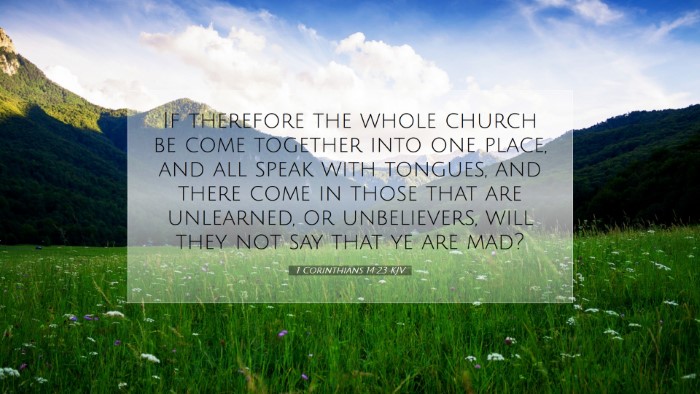Old Testament
Genesis Exodus Leviticus Numbers Deuteronomy Joshua Judges Ruth 1 Samuel 2 Samuel 1 Kings 2 Kings 1 Chronicles 2 Chronicles Ezra Nehemiah Esther Job Psalms Proverbs Ecclesiastes Song of Solomon Isaiah Jeremiah Lamentations Ezekiel Daniel Hosea Joel Amos Obadiah Jonah Micah Nahum Habakkuk Zephaniah Haggai Zechariah MalachiVerse
1 Corinthians 14:1 1 Corinthians 14:2 1 Corinthians 14:3 1 Corinthians 14:4 1 Corinthians 14:5 1 Corinthians 14:6 1 Corinthians 14:7 1 Corinthians 14:8 1 Corinthians 14:9 1 Corinthians 14:10 1 Corinthians 14:11 1 Corinthians 14:12 1 Corinthians 14:13 1 Corinthians 14:14 1 Corinthians 14:15 1 Corinthians 14:16 1 Corinthians 14:17 1 Corinthians 14:18 1 Corinthians 14:19 1 Corinthians 14:20 1 Corinthians 14:21 1 Corinthians 14:22 1 Corinthians 14:23 1 Corinthians 14:24 1 Corinthians 14:25 1 Corinthians 14:26 1 Corinthians 14:27 1 Corinthians 14:28 1 Corinthians 14:29 1 Corinthians 14:30 1 Corinthians 14:31 1 Corinthians 14:32 1 Corinthians 14:33 1 Corinthians 14:34 1 Corinthians 14:35 1 Corinthians 14:36 1 Corinthians 14:37 1 Corinthians 14:38 1 Corinthians 14:39 1 Corinthians 14:40

